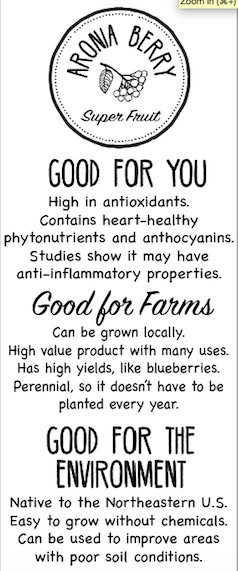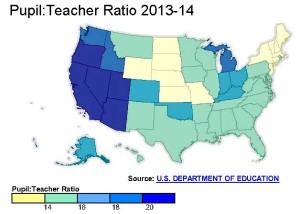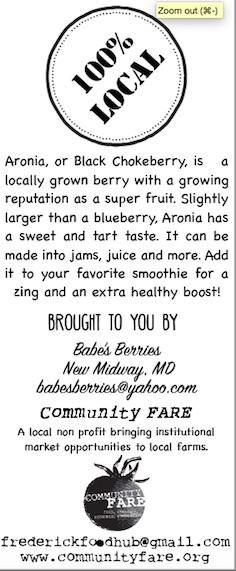 ]]>
]]>
A ratio of more than 20 students per teacher is generally considered undesirable. In fact, 12 states have adopted laws requiring a ratio of 20 students or less per teacher.
]]>
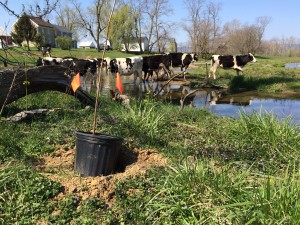 Stream Link Education, along with 25 volunteers planted along one side of Glade Creek, noting that cows still have access to the creek on the other side! We have learned that the landowner on the other side is working on fencing out the cows and is interested in stream buffer restoration as well. Great news! Glade Creek is a tributary to the Monocacy River, a drinking water source for Frederick City residents.
]]>
Stream Link Education, along with 25 volunteers planted along one side of Glade Creek, noting that cows still have access to the creek on the other side! We have learned that the landowner on the other side is working on fencing out the cows and is interested in stream buffer restoration as well. Great news! Glade Creek is a tributary to the Monocacy River, a drinking water source for Frederick City residents.
]]>Becky, CRE’s representative, led attendees through basics for evaluating a land-lease option and alternatives to leasing one’s farm land for a solar array.
The result was that the President of the Garrett County Farm Bureau, Bill Bishoff, suggested that the program as presented go “on the road” and should include access to an expert in land-lease agreements for energy generation, may be important to farms across the state. CRE is taking leadership on that initiative.
]]>
April 23rd: get some photos of stream bank erosion, free pizza and a t-shirt
A new campaign to raise awareness about how sediment can affect water quality has launched in Frederick County. “Is This Erosion?” encourages community members of all ages to use a website and mobile phone application to share your photos of places where stormwater runoff is wearing away banks and depositing sediment into rivers and streams. Friends of Frederick County (FoFC) is calling on volunteers to participate in celebration of Earth Day 2016! Show us your photos, win a free t-shirt and join others for pizza and to share your photos! We will use your photos to help us determine stream protection actions to take, such as riparian plantings.
“River and stream erosion can degrade the quality of our drinking water and deprive fish, frogs and other animals of the habitat they need to live,” said Brent Walls, Upper Potomac Riverkeeper. “By participating in the #Isthiserosion? campaign, residents can learn how to recognize erosion and report it to others who can address its effects.”
Water Reporter documents and maps volunteer reports through a simple mobile app and website. Each new report help builds a comprehensive library of observations about the state of rivers and streams, including potential water quality threats or progress at correcting problems. Because volunteers are outdoors at different times and places, they can provide information that environmental groups and government officials can use to monitor river and stream health.
FoFC has had success using this mobile app to alert government officials about water pollution sources, and over 25 have been addressed with cow fencing, silt fencing, tree plantings and stream clean ups. A FoFC partner organization, Stream Link Education (streamlinkeducation.org), raises native tree and shrub seedlings at the Scott Key Center and at Mount St Mary’s University for planting along eroded stream banks throughout the county, and has planted thousands of trees. Now, citizen reports sent through Water Reporter system provide important information on new sites that need vegetation to protect streams from erosion.
RSVP to be on Earth Day Water Reporter Volunteer Team by sending an email to [email protected] and get your instructions on how to participate and where to meet on April 23rd 4-6pm for pizza (note no photos, no pizza!). We need at least ten dedicated volunteers, so engage your friends and family with smart phones to use the app and take some photos. Email us now for instructions.
We need your help!
]]>Where: Area 31 31 East Patrick Street Frederick, Maryland 21701
When: April 21st Doors open at 6:00pm, movie starts at 7:00
Cost: We are asking for a $10 minimum donation.
On April 21st Community FARE will be hosting a special local food food happy hour film screening in partnership with Area 31 and the creators of Harvests of Hope, a movie about small farmers making a big difference in the face of climate crisis.
The doors open at 6pm. Come enjoy music, beverages and local treats, followed by a 45 minute special sneak preview at 7 and a discussion on climate change and agriculture with the film’s creators.
Get Tickets Here http://www.eventbrite.com/e/harvests-of-hope-sneak-preview-tickets-24248473838?aff=affiliate1
Find us on facebook and twitter for event updates.
www.facebook.com/harvestsofhope
www.twitter.com/hopeharvests
About the producers:
Karen Buchsbaum:
Karen has a lifelong passion for food, farming and education Karen founded Community FARE while completing her Master’s degree in environmental education and working as an agricultural Extension Agent with University of Maryland Extension
She is currently a PhD candidate at Antioch University New England, where she is using agent-based modeling to study agricultural adaptation response to climate change.
After years of researching, teaching and advocacy, Karen grew tired of being inundated with disempowering and hopeless messages about our broken food system, and the future of the planet. She set out to find a real reason for hope, and that’s how the idea of Harvests of Hope was born.
Koorosh Farchadi
Koorosh received a degree in film and media studies at George Mason University, where he was Director of the Mason Cable Network . After graduating, he focused his work on video journalism and documentary, working for the Associated Press.
Since then, he has produced media in English, Spanish and Farsi for organizations like The World Bank Institute, The E-Collaborative for Civic Education, and George Mason University.
He currently works as a video producer for the National Science Foundation.
In his free time Koorosh is an avid gardener and world traveler. Harvests of Hope is a project that allows him to merge his work in film with his love of nature and the outdoors.
]]>
Today I got a solicitation from an electric power supply vendor asserting that I am now responsible for choosing the source of my electrical power supply, and that if I prefer my electricity to come from clean renewable sources, to simply return a “Clean Energy Option” card to the sender.
There is some truth to this assertion…but it contains several potentially misleading representations:
First, an electricity customer is neither responsible nor obligated to separately choose an electricity supplier. The electricity delivered today, if you make no changes, is by your “default provider” and is considered “standard offer service.”
Secondly, in Maryland, you may choose your source of electricity (i.e. electrons) … and natural gas… suppliers and thereby support certain clean renewable energy options.
However, you may not choose who delivers your power to you, i.e. if you are in the Potomac Edison (PE) Service Territory, you will have a meter from PE and power lines owned by PE will deliver power to your home, farm or business.
The electricity/electrons you buy from your distribution utility (PE) is your “standard offer” service. The electricity you are delivered is comprised of a mix of electrons from a variety of generation types and sources (1).
Additionally, your electric power supplier may have a clean energy option. You may not need to change suppliers if you want to have a “cleaner” energy mix.
But most importantly, you are under no obligation to make a change, from purchasing electricity from your power supplier to any other supplier organization.
However, if you want to evaluate the merits of making a power supplier change, please carefully evaluate vendors, compare pricing, contract terms and potential other differences (2). Energy suppliers who would like to contract directly with you must be licensed by the Maryland Public Service Commission. (See Consumer Information Supplier Search for a list of licensed active suppliers in a service area. http://www.psc.state.md.us/supplier-search/).
Note that the “Clean Energy” party soliciting me was NOT on this list!
Why would someone want to change the “type” of electricity they purchase?
Many of us are interested in supporting clean renewable energy. Having a “power to choose” contract allows one to indirectly invest in someone’s clean, renewable energy production facility, but you don’t know where this is located. For instance, you can invest in 100% wind energy projects. However, the location of the wind project may be hundreds of miles away, and the mix of electrons actually delivered to your meter is not likely influenced by your purchase. So, while you are supporting clean energy production, you do not necessarily receive any additional clean, renewable electrons in exchange for your investment.
What are other ways to ensure you have invested well in local, clean renewable energy?
To assure yourself that clean, renewable energy is provided to your home, farm or business, the renewable energy produced must be either (a) connected directly to your own meter, (whether you purchase, lease or bulk-purchase), (b) directly connected to another meter in your service territory and owned by a Community Solar Ownership Plan to which you subscribe, or, (c) directly invest in a group Solar Ownership organization.
For many people, there are limited options available for having one’s own solar project. Challenges include being a renter, having a roof that is not well oriented for a solar project, or not having adequate discretionary investment funds available. To remove some of these challenges, there are new options available to support the clean energy economy and have a more direct benefit in which the renewable electrons produced locally are used locally.
- Maryland’s Public Service Commission (PSC) is in the final round of approving regulations for Community Solar Energy Ownership Plans in a Pilot Project. It is expected that the regulations will be finalized in May. In this model, you may become a “subscriber” to a solar project that is locally owned and which provides local benefits. This is sometimes called a “shared solar” or “solar garden” model.
- Two other organizational models, each designed for co-owning solar energy, may include: the University Park (MD) Solar project, a limited liability company, and the Clean Energy Cooperative Project in Pennsylvania, a for-profit cooperative.
We will discuss the Community Solar Energy Subscriptions, Joint Ownership Organizations and Bulk Purchase Solar Cooperative models in future articles.
Summary:
(1) Sources of electricity delivered by Potomac Edison throughout their service territory is described within their FAQ’s.
“In general, our generation fleet is made up of approximately 56 percent coal, 24 percent nuclear, 11 percent hydro, wind and solar sources, 8 percent natural gas and 1 percent oil. Approximately 99 percent of our electricity comes from non-emitting nuclear and low-emitting natural gas, scrubbed coal or renewable facilities. Like other utilities, all of FirstEnergy’s power plants are interconnected into the regional grid that encompasses several states. Your house draws power from that grid, therefore, there is no way to know exactly where your power is coming from.” (www.firstenergycorp.com/environmental/faq.html)
- if you’d like to learn more about your rights to change – or not to change – electric power suppliers, go to the Maryland Clean Energy Center’s “Power to Choose” information page.
(http://mdcleanenergy.org/consumer/power-choose/suppliers)
If you have questions, experiences to share or comments about your “Power to Choose” options, or any of the emerging group solar ownership organizations, please send them to Rebecca @ communityrenewableenergy.org.
]]>
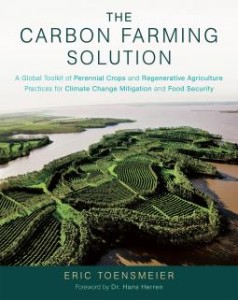 They’re heeeeeeeere!
They’re heeeeeeeere!
The Carbon Farming Solution – fresh out of the box. Agriculture is rightly blamed as a major culprit of our climate crisis. But in this groundbreaking new book, Eric Toensmeier argues that agriculture—specifically, the subset of practices known as “carbon farming”—can, and should be, a linchpin of a global climate solutions platform. Get your copy today.
]]> We’re shipping over over 130,000 tons of it every year to PA at a cost of over $6 M.
We’re shipping over over 130,000 tons of it every year to PA at a cost of over $6 M.
There will be a meeting on Monday Feb. 29 at Winchester hall to summarize findings from recent public forums and guide report preparation. for details see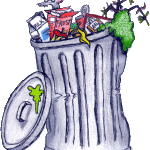 https://www.frederickcountymd.
https://www.frederickcountymd.
Zero waste? C’mon, get real. That’s impossible. There’s always going to be trash. Sheeesh, what planet are you from?
Zero waste is a goal. Ending poverty, hunger and war are also goals. Just because we’re not going to achieve them in the near future doesn’t mean we should abandon them. If you start on a trip without a goal, you waste (ha!) your time and effort going in random directions. Read the full article.
Actually, I don’t particularly care for the term “zero waste,” but it seems to have caught on fairly widely. Maryland has a draft zero-waste plan, and it has been proposed to the Frederick County Solid Waste Advisory Steering Committee that Frederick County adopt a zero-waste policy.
Frederick County is nowhere near zero in its waste production. Despite successful efforts in residential and business recycling, composting of yard waste and other diversion efforts, we are still producing thousands of tons of waste every year. Most of its goes to a landfill in Pennsylvania, and it costs us a pretty penny to dispose of it there. In 2014, it cost us $8,347,136 to ship and dump 137,000 tons of trash.
Zero waste can point us in a better direction. Here is the long-term goal, according to Wikipedia: “Zero Waste means designing and managing products and processes to systematically avoid and eliminate the volume and toxicity of waste and materials, conserve and recover all resources, and not burn or bury them.” Does this Wikipedia definition add anything? The short-term goal below seems sufficient.
The short-term goal for Frederick County is to drastically reduce that 137,000 tons we send to a landfill. Here are some realistic ideas:
- Organics: Frederick County should establish a large composting facility that will divert food, other organics and wet paper from landfills. These materials make up over 30 percent of the overall waste stream. Such a facility could be a private business, a public-private partnership or a county-owned operation. The initial goal of the composting program would be to process food waste from large institutions such as schools, food stores, hospitals and restaurants.
- Recycling: Improve our recycling program. All county facilities and operations must participate in recycling. Schools are particularly important. Custodial staffs will need training and monitoring to see that this program is properly implemented. Apartment buildings, businesses and medical facilities should be included in a county-wide recycling program. Each municipality should be encouraged to increase its recycling rate in various ways. Some possible approaches:
- Organize a “Biggest Loser” contest for the municipality that reduces its MSW collection by the largest amount each year.
- Encourage municipalities to institute save-as-you-recycle (aka pay-as-you-throw) programs. An incentive is already in place: Municipalities currently pay a $69-per-ton tipping fee for waste, but pay no tipping fee for recyclables collected. The savings could be passed on to taxpayers.
- Resource recovery facility: the co-location of reuse, recycling, compost processing, manufacturing and retail business in a central facility. A resource recovery park can include thrift stores; repair centers for bikes, computers and appliances; a paint-blending location; construction and demolition materials; and secondary manufacturing such as manufacturing dog beds from discarded mattresses. Such a facility could be a private business, a public-private partnership, or a county-owned operation.
- Refunds on beverage containers: Endorse the Maryland Redeemable Beverage Container Refund and Litter Reduction Act, which will be considered by the Maryland Legislature this session. Four billion beverage containers are purchased in the state of Maryland each year. Only one quarter of these containers are currently recycled. That leaves 3 billion containers that end up in waterways, parks, along the roadside and ultimately in landfills and incinerators. This bill will encourage increased recycling of these 3 billion containers, with the benefit of reducing litter. With passage of this bill, a 5-cent refund would be available for all glass, aluminum and plastic beverage containers. The Maryland Environmental Service would run the program, which would be entirely self-financed through unredeemed deposits. The 10 states that already have programs like this recycle between 60 percent and 90 percent of their bottles.
These points will be a big step towards zero waste. That’s not so hard, is it?
Ellis Burruss is an appointed member of Frederick County’s Solid Waste Steering Committee and a board member for Friends of Frederick County. He is a resident of Brunswick, where he owns a printing business and serves on the City Council.
